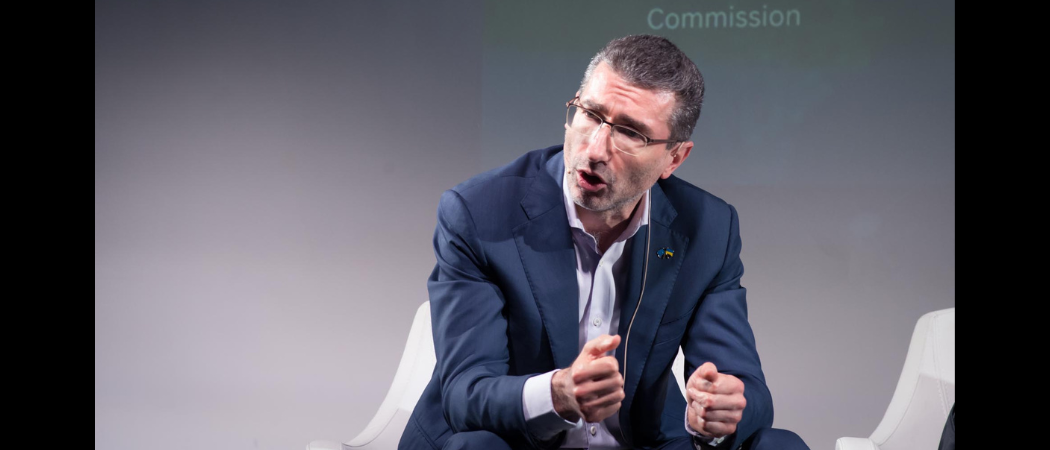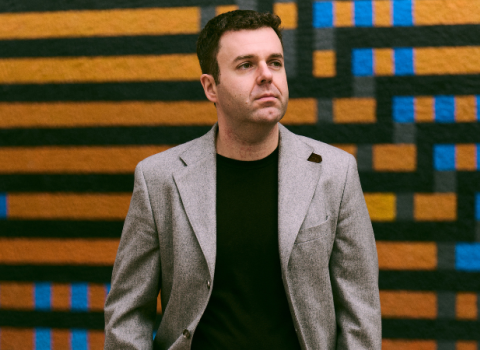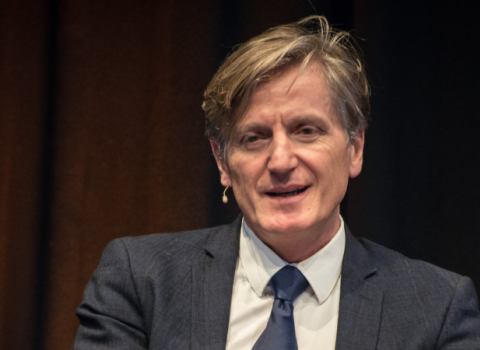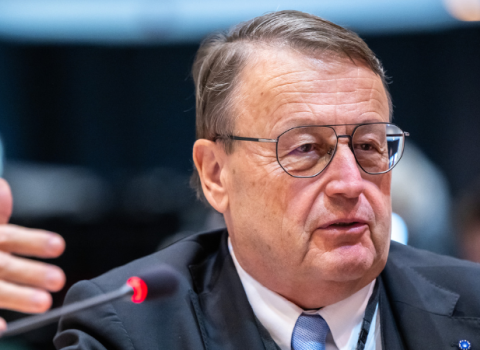Research director general says ‘everything is on the table’. Leading MEP tells Science|Business conference the European Institute of Innovation & Technology could have 'common structure' with European Innovation Council

Marc Lemaître, director general for research and innovation at the European Commission's research directorate, speaking during Science|Business' annual conference on 13 February in Brussels
Marc Lemaître, director general for research and innovation, appears receptive to calls to merge the European Institute of Innovation & Technology (EIT), after demands from member states and MEPs for it be dissolved.
The Danish government has already argued the Budapest-based body should be “discontinued” so as to simplify the next framework programme, due to start in 2028, and reduce overlap with the newly established European Innovation Council (EIC).
During a Science|Business conference panel discussion on February 13 in Brussels to discuss the next, tenth framework programme (FP10), Portuguese MEP Maria da Graça Carvalho - herself one of the legislators behind the EIT - added her voice to calls for a significant rethink of the agency.
“For example with the EIC and the EIT – and I defend the two – probably they can have common structures, probably don’t need to be different two agencies,” she said. “Everything is on the table,” said Lemaître in response.
With so many new EU research and innovation instruments now in play, “there is a certain consensus that we need to rationalise, especially if public means are short,” he said.
If the EU wants to exploit its scientific results more effectively, “we have some reflections to do,” Lemaître said.
Founded in 2008 to try to replicate the success of the Massachusetts Institute of Technology in Europe, the EIT has grown into nine so-called knowledge and innovation communities, ranging from digital companies to clean energy.
But only three of these have announced paths to become financially self-sustaining, as originally planned.
“Some of them are getting there,” said Lemaître. Nonetheless, “we clearly have some reflection to do there.”
In contrast, Lemaître called the EIC, fully launched under Horizon Europe to give companies the scale of equity funding European financial markets often struggle to provide, a “fantastic success”.
A Commission report on EU competitiveness, released on 14 February, also said that it would “continue to develop and implement policies that target the promotion of deep tech and green tech innovative start-ups and scale-ups, including by building up the capabilities of the European Innovation Council.”
However, the same report does also praise the EIT for helping direct €7.3 billion of private capital into EU start-ups.
Associated countries
Lemaître also offered his thoughts on another recurring topic of discussion at the conference: whether newly associated countries like New Zealand, Canada and the UK should have more of a governance say over the next programme.
Despite paying into the budget, associated countries do not get a vote when deciding on Horizon Europe work programmes - the calls that go out for applications.
They can also be excluded from sensitive calls by a decision of EU member states, an issue that could become even more pertinent if, as floated by the Commission, military research is permitted in FP10.
Asked whether associated countries should instead have the same governance rights as EU member states, Lemaître acknowledged that “new questions have emerged” as the framework programmes have expanded outside the EU.
He pointed out that most associated countries are EU membership candidates, or near neighbours in the southern Mediterranean.
As for Canada and New Zealand, the fact they are willing to give up budgetary control is a mark of how attractive the programme was, Lemaître argued.
“Fundamentally, what these countries are doing is basically agreeing to contribute to a programme where they basically have no control,” he said. “So it is quite unique”.
“They must be seeing the advantages of doing that, of renouncing decision making power […] over their public money”.
Just 3% of calls are currently restricted to EU member states, he stressed, for example in quantum technologies. However, “we will have some […] more questions down the road, no doubt, given the present evolving public debate around research security and economic security,” he added.
Criticism from Germany
The panel also heard several sharp criticisms of Horizon Europe from German lawmaker Thomas Jarzombek, research and education spokesman for the opposition Christian Democrats.
He said the programme lacked real competition among companies for bids. “When you look at the space programmes […] there is no competition at all,” he said.
He also suggested early milestones for projects, perhaps after 10% of the budget was spent, that need to be hit otherwise funding should be pulled.
“Most companies have to die, and then projects have to die, but they have to die soon and early,” he said. “Not every project can be a success”.
He also said the mooted inclusion of military, dual use research in FP10 was a “once in a lifetime opportunity” to stimulate European innovation.
What is missing from Europe, but present in the US, are huge military procurement contracts that could also bring in vast quantities of private funding into new companies providing dual use technology. “Procurement is key,” he said. “With this little trick […] you can make an explosion of innovation.”





 A unique international forum for public research organisations and companies to connect their external engagement with strategic interests around their R&D system.
A unique international forum for public research organisations and companies to connect their external engagement with strategic interests around their R&D system.